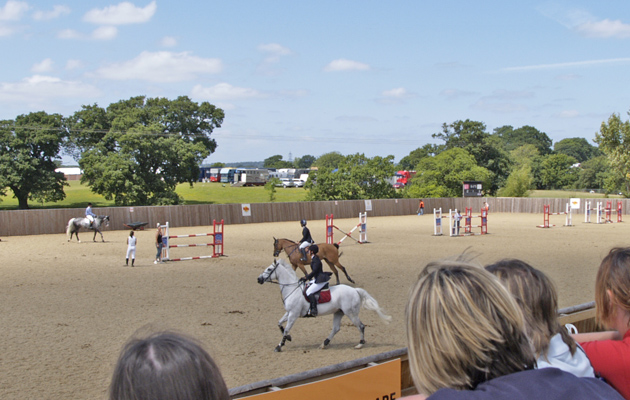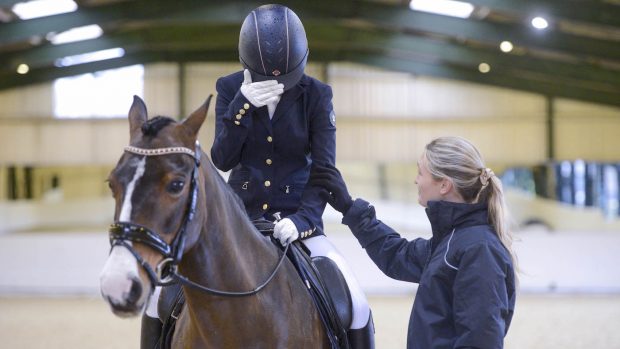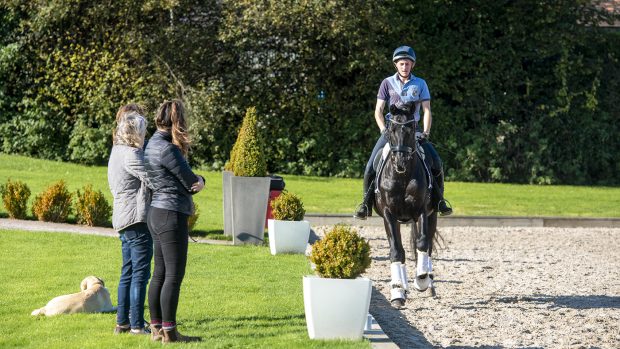Nerves — we all feel them. But what if they’re making competition days a stress and taking away from the fun of it all? There is a wealth of tips on how to combat competition nerves online, but do they work for everyone? Rachel Fraser spoke to real riders who reviewed what works, and what doesn’t, for them.
Leading performance psychologist Charlie Unwin knows a thing or two about nerves. He explained that often riders fail to prepare for the reality of a competition, noting that competing is more of a mental challenge than a physical one and that it’s important to re-create a high-pressure environment when practising at home.
Charlie also recommended working on your mindset when it comes to successes and failures, noting that elite riders tend to visualise their successes, which nurtures their confidence and the importance of setting achievable goals. His last tip was to remember to breathe – one which I’m sure many of us can relate to!
But do the same techniques work for everyone? I spoke to real riders to find out…
Sarah Shepheard, of Totally Amateur Eventing, said: “There’s something about shows that really gets the butterflies in my stomach flapping, so these tips are ideal for me. I completely agree with Charlie’s point about practising. If I feel prepared, having put the hours in training before a competition, I always feel more relaxed on the day. I like to feel prepared mentally as well — so knowing my dressage test inside out, or trying to walk the showjumping or cross-country course the day before where possible.

Sarah Shepheard
“Personally, I haven’t found visualisation to be helpful, but I know it really works for some people. I’m quite competitive by nature, so visualising everything going well just makes me more competitive, fuelling my nerves rather than calming them.
“The tip about setting small, realistic goals works better for me, rather than visualising our performance going amazingly and winning all my classes — which is about as likely as finding Valegro in my stable tomorrow!
“I also use a brain training technique where I substitute the word ‘nervous’ for ‘excited’. It sounds silly, but I’ve found that just by saying I’m excited about the competition, it totally changes my mindset and I actually feel more optimistic and less worried — try it.
“I’m also definitely one for writing things down. My blog has helped with that, as I can go back and look at how far we’ve come and remind myself that actually, we’re doing ok.”
Carly Warren, a seasoned Trec competitor, agrees that preparation is key to feeling calm on competition day: “When you compete in Trec, venues can be off the beaten track and finding some can be difficult. I recommend buying an Ordnance Survey map of the area you are heading to, so you can find the venue before you leave home, as some are off narrow country roads. The prospect of stunning orienteering in the countryside on your horse, and a full weekend away with Trec friends, means that long and occasionally stressful journeys are soon forgotten.”
For some riders, the fear of show-day builds up in advance. Sophie Hawkesford, who rides at The Dressage Secret Training Centre & Riding School, explained: “I don’t have a horse of my own, but I’m lucky enough to ride an ex-one-star eventer, Nico, at my riding school.

Sophie Hawkesford
“My nerves build up way before the competition. Even if I’m just riding at a clinic, held at the riding school, I can feel my riding go to pot. Having an instructor constructively critique my weak points challenges my capabilities and helps me get out of my comfort zone so I can ride Nico to his full potential.”
Continued below…
Like this? You might also enjoy reading these:
6 ways positive psychology can make you a better rider
Subscribe to Horse & Hound magazine today – and enjoy unlimited website access all year round
Preparation remained a key piece of advice from our riders, with Nic from Diamonds In The Rough Dressage (pictured top) saying: “Prepare as much as possible. I allow an extra half an hour ‘messing around time’ so I can stay focussed on preening and polishing rather than worrying about traffic and a shorter warm-up.
“Learning your test so it becomes second nature means you can really ride in the ring, rather than just playing pilot. I tend to stay off social media for the day too — it’s great for many things but can wind me up so I close my eyes and ears to it.”
Still looking for the tip that works for you? Read more expert advice on how to conquer competition nerves on Horse & Hound.
For all the latest equestrian news and reports, don’t miss Horse & Hound magazine, out every Thursday



